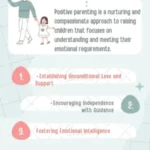Parenting is an intricate dance, a delicate interplay of love, discipline, and guidance. It is a journey where the pursuit of perfection intertwines with the acceptance of imperfection. The quest for effective parenting transcends mere actions; it delves into the realms of intention and aspiration.
Decoding the Essence of Good Parenting
A good parent is not defined by flawless execution but by a relentless commitment to decisions in the child’s best interest. Perfection is an elusive goal, and acknowledging the imperfections of both parents and children is pivotal. In our pursuit of successful parenting, the focus shifts from achieving perfection to becoming resilient, good enough parents.
Setting lofty standards for ourselves precedes setting them for our children. As role models, parents play a crucial role in shaping the behavioral and attitudinal foundations of their offspring. This is where the uniqueness of human learning by imitation comes into play – a phenomenon deeply ingrained in our programming.
The Pinnacle of Parenting Wisdom: Top 10 Tips
Embarking on the journey of parenthood prompts the exploration of invaluable insights, encapsulated in the top 10 parenting tips for nurturing thriving parent-child relationships.
#1 Be A Good Role Model
Authenticity reigns supreme as parents walk the walk, demonstrating desired behavior rather than merely prescribing it. The power of human imitation is harnessed to instill values through actions, with children keenly observing and absorbing positive behaviors and attitudes.
#2: Love Them, Hug Them And Show Them Through Action
The expression of unconditional love through tangible actions becomes a cornerstone of effective parenting. Simple acts, such as hugs, quality time, and empathetic listening, transcend the misconception that showing affection can spoil a child. Instead, they release feel-good hormones, fostering a deep connection and resilience in the child.
#3: Practice Kind And Firm Positive Parenting
Understanding the intricate neural landscape of a child’s brain becomes pivotal. Positive family interactions in the early years sculpt neural connections, influencing a child’s development. Engaging in uplifting activities and solving problems with a positive attitude creates lasting memories and good behavior.
#4: Be A Safe Haven For Your Child
Consistent responsiveness, support, and acceptance create a secure environment for a child to explore and return to. Children raised by such parents exhibit enhanced emotional regulation development, social skills, and mental health outcomes.
#5: Talk With Your Child And Help Their Brains Integrate
Communication becomes a dual-purpose tool – fostering a better relationship and aiding the integration of different parts of a child’s brain. Attuned communication through talking about troubling experiences without the need for solutions contributes to improved mental well-being.
#6: Reflect On Your Own Childhood
Reflecting on one’s own upbringing is a conscious step toward understanding and consciously changing parenting methods. Acknowledging aspects to change and implementing adjustments in real-time forms part of the continuous process of evolving parenting methodologies.
#7: Pay Attention To Your Own Well-Being
Parental well-being is crucial, preventing burnout and ensuring a healthy family life. Neglecting personal needs can lead to significant problems down the road. Strengthening the parental relationship and prioritizing self-care rejuvenate the mind and contribute to effective parenting.
#8: Do Not Spank, No Matter What
Discarding physical discipline in favor of non-violent alternatives proves essential. Spanking may offer short-term compliance but fails to teach right from wrong. Opting for positive discipline and reinforcement establishes a foundation for better outcomes in the long run.
#9: Keep Things In Perspective And Remember Your Parenting Goal
Aligning parenting efforts with long-term goals shifts the focus beyond daily survival. Transforming negative experiences into learning opportunities contributes to a healthy parent-child relationship.
#10: Take Shortcut Parenting Advice By Utilizing Findings In The Latest Psychology And Neuroscience Research
Leveraging scientific knowledge becomes a strategic advantage in parenting. Science-backed techniques and practices offer a nuanced approach tailored to individual child temperaments. The avoidance of sub-par parenting practices in favor of well-researched alternatives is emphasized.
The Path to Exceptional Parenting
In conclusion, the journey of parenting is indeed challenging, with rewards often manifesting in the future. Striving for excellence now ensures a harvest of fulfillment later.





